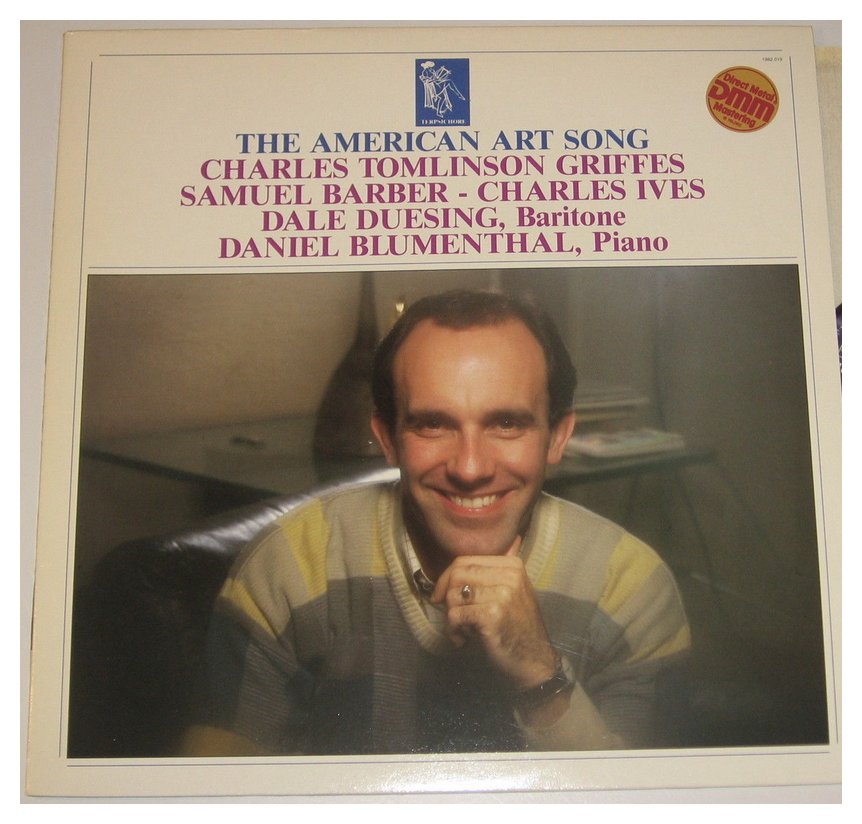

| Dale Duesing (a 1967 graduate of
the Lawrence Conservatory of Music) is recognized as one of the leading baritones
on the international music scene, having scored musical triumphs at major
opera houses throughout the world. He has performed at New York's Metropolitan
Opera (in major roles including Billy Budd, Papageno, Figaro, Pelléas,
Malatesta, etc.), San Francisco Opera, Chicago Lyric Opera, La Scala, Vienna
State Opera, Covent Garden, Paris Opera, Hamburg Opera, The Netherlands Opera
Amsterdam, Munich State Opera, Berlin Opera, and the Liceo Barcelona among
many others. He has been a regular performer at the leading music festivals
of the world, including Salzburg, Edinburgh, Glyndebourne, Santa Fe, and
Blossom. He has appeared as soloist with the leading orchestras of the world,
including the Cleveland Orchestra, the Boston Symphony, the Chicago Symphony,
the New York Philharmonic, the Vienna Philharmonic, the London Philharmonic,
the London Symphony, the BBC Symphony, the Los Angeles Philharmonic, the Orchestra
of Paris, the Concertgebouw, the Berlin Philharmonic, the Santa Cecilia Orchestra
of Rome, and the Suisse Romande Orchestra. The long list of distinguished
conductors with whom he has collaborated includes Böhm, Bernstein, Levine, Giulini,
Haitink, de Waart,
von Karajan, and Ozawa. Mr. Duesing received a Grammy in 1993, was designated Singer of the Year by Opernwelt magazine in 1994, and was described by Le Monde de la Musique 1998 as "a singer who changed opera in the 20th century. His performances of Wozzeck were a triumph." He has most recently received the award for Best Male Performance in 2000 by the Amsterdam based Friends of the Opera for his performance of Beckmesser in Wagner's Die Meistersinger. Mr. Duesing's repertoire has always included both old familiar roles and unfamiliar new roles, and his most recent and current activities clearly continue this tradition: Johann Strauss' Die Fledermaus at both the Salzburg Festival and the Semper Opera in Dresden; Beckmesser with both The Netherlands Opera Amsterdam and the Frankfurt Opera; Zemlinsky's Der Zwerg at the Paris Opera; the world premiere of Wintermärchen by Phillipe Boesmans with the Royal Opera Brussels, and later again at the Liceo Barcelona; Janáček's The Makropoulos Case at the Netherlands Opera; and the world premiere of Nicolas Maw's Sophie's Choice at Covent Garden. -- From the website of Lawrence
Conservatory of Music
-- Names on this webpage which are links refer to my Interviews elsewhere on my website. BD |
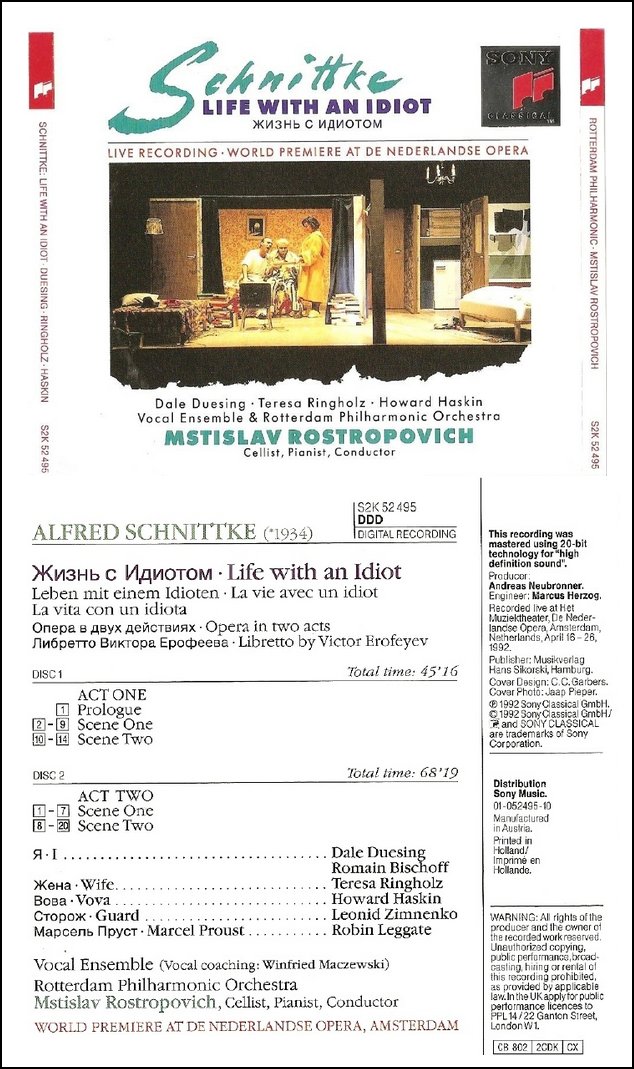 BD: Will it stay in the repertoire?
BD: Will it stay in the repertoire? BD:
When you're onstage, are you conscious of the audience you are trying to communicate
with?
BD:
When you're onstage, are you conscious of the audience you are trying to communicate
with?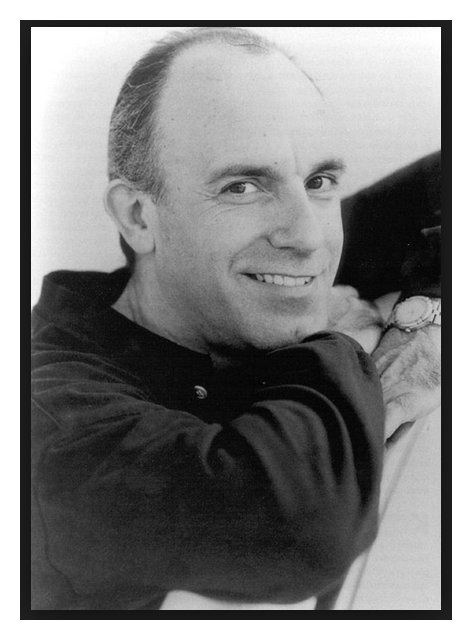 Dale: I would like to say I become the person, but on
the other hand, I would like to say that I'm portraying him still. I
think it is the combination of the two which is best. I know the feeling
of being so totally enveloped in the character that there is no other way
to be, but I am still portraying the part. A certain amount of control
has to be there, otherwise a singer may lose his voice or break his neck
or whatever. But you can lose yourself to a certain point so that what
you're doing is the only thing you can do. For instance, I
did a wonderful production of Don Giovanni
with Christopher Alden — who will be doing it
with the Chicago Symphony here soon — and it was such
a bizarre reading of that opera and that role, that by the final scene there
was nothing I could do but what I was doing in that scene. I was totally
lost in the role, but I was also totally aware that I had to be singing and
breathe correctly. So it's a little of both.
Dale: I would like to say I become the person, but on
the other hand, I would like to say that I'm portraying him still. I
think it is the combination of the two which is best. I know the feeling
of being so totally enveloped in the character that there is no other way
to be, but I am still portraying the part. A certain amount of control
has to be there, otherwise a singer may lose his voice or break his neck
or whatever. But you can lose yourself to a certain point so that what
you're doing is the only thing you can do. For instance, I
did a wonderful production of Don Giovanni
with Christopher Alden — who will be doing it
with the Chicago Symphony here soon — and it was such
a bizarre reading of that opera and that role, that by the final scene there
was nothing I could do but what I was doing in that scene. I was totally
lost in the role, but I was also totally aware that I had to be singing and
breathe correctly. So it's a little of both.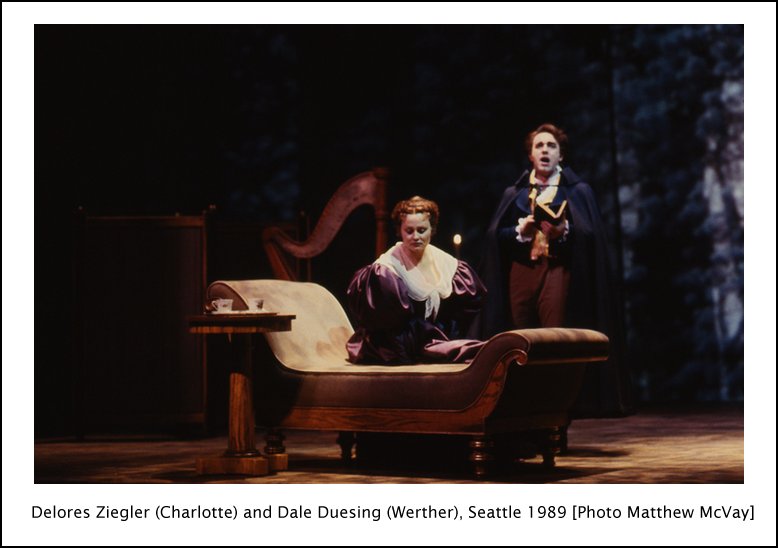
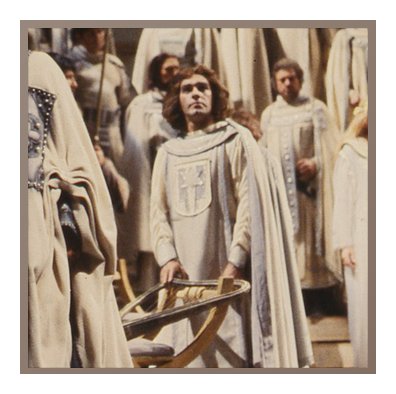 Dale: That's it. As we're talking now, I am looking
at these figures which I like, thinking of my favorite roles. I don't
have a favorite, but the ones I enjoy the most are Papageno, Pelléas,
Billy Budd, Beckmesser, and Wolfram. All of them have a great similarity
— even Beckmesser! Beckmesser leaves town; Wolfram goes off
and we never know quite where. [Photo
at right shows Duesing as Wolfram in his Seattle Opera debut. It was
also the Seattle Opera debut for conductor Hermann Michael.]
I do Beckmesser differently from most because I think he is a very sympathetic
person.
Dale: That's it. As we're talking now, I am looking
at these figures which I like, thinking of my favorite roles. I don't
have a favorite, but the ones I enjoy the most are Papageno, Pelléas,
Billy Budd, Beckmesser, and Wolfram. All of them have a great similarity
— even Beckmesser! Beckmesser leaves town; Wolfram goes off
and we never know quite where. [Photo
at right shows Duesing as Wolfram in his Seattle Opera debut. It was
also the Seattle Opera debut for conductor Hermann Michael.]
I do Beckmesser differently from most because I think he is a very sympathetic
person. 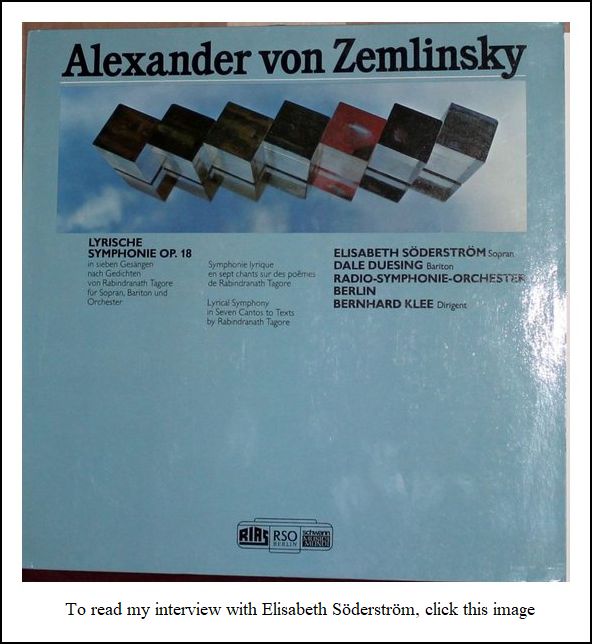 BD: Would it have worked out if Mélisande
had been discovered by Pelléas instead of by
Goloud?
BD: Would it have worked out if Mélisande
had been discovered by Pelléas instead of by
Goloud?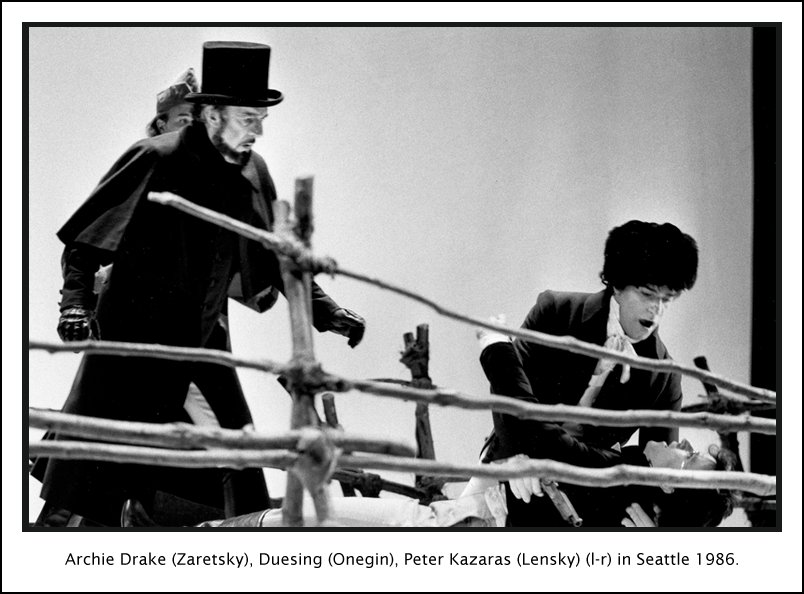 BD: You've done Eugene Onegin?
BD: You've done Eugene Onegin?
© 1991 Bruce Duffie
This conversation was recorded in Chicago on October 28, 1991.
Portions were broadcast on WNIB in 1995 and 2000. The sections on French
Opera were published in The Massenet Newsletter
in January, 1992. The transcription was completed and re-edited, and
posted on this website early in 2017.
To see a full list (with links) of interviews which have been transcribed and posted on this website, click here.
Award -
winning broadcaster Bruce Duffie was with WNIB, Classical 97 in Chicago
from 1975 until its final moment as a classical station in February of 2001.
His interviews have also appeared in various magazines and journals since
1980, and he now continues his broadcast series on WNUR-FM, as well
as on Contemporary Classical Internet Radio.